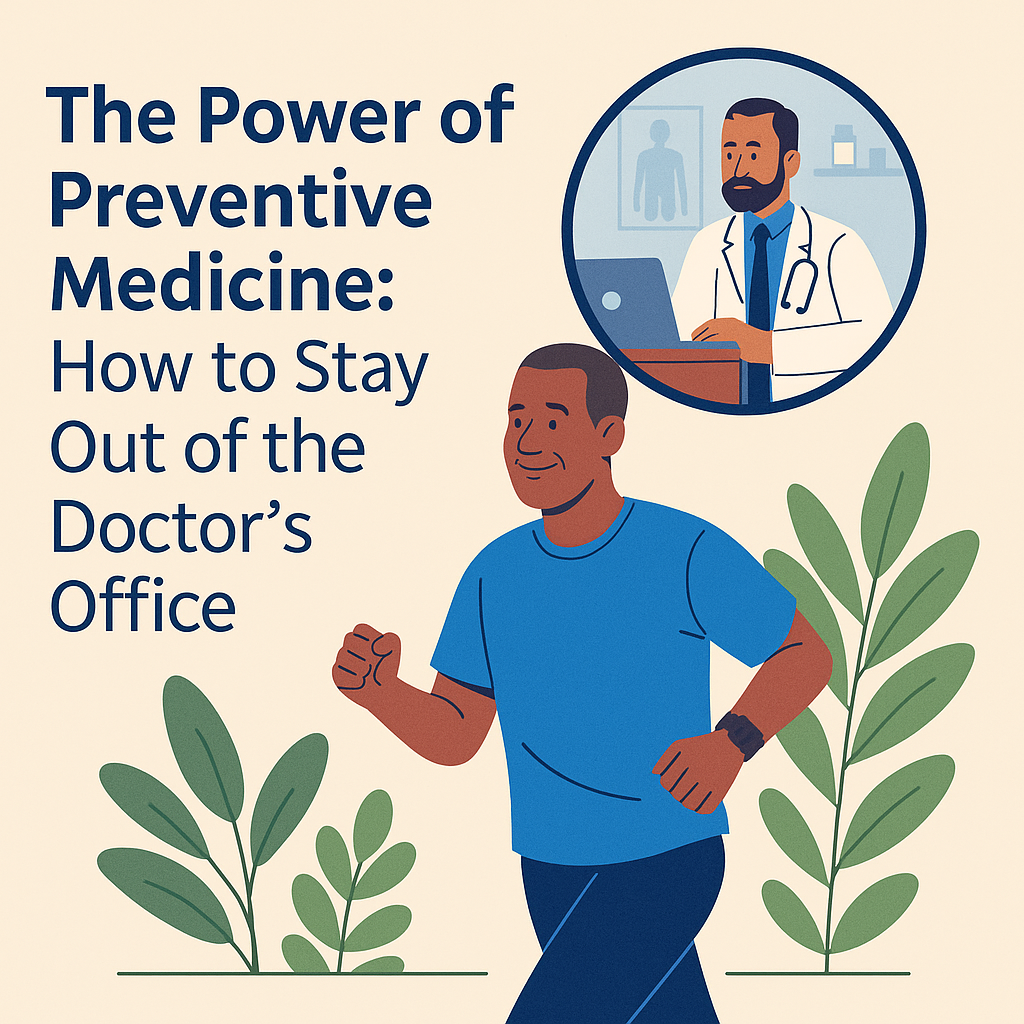1. Introduction: Why Prevention Matters
In today’s fast-paced world, people often wait until something goes wrong before they see a doctor. But what if we could avoid illness altogether? Preventive medicine is not just a buzzword—it’s a shift in perspective. It means prioritizing long-term health over short-term fixes, focusing on root causes instead of symptoms, and building a lifestyle that promotes resilience. With over four decades of clinical experience, I can confidently say that the most powerful form of healthcare is the one that keeps you healthy to begin with.
2. What Is Preventive Medicine?
Preventive medicine is the branch of medical science focused on preventing disease before it occurs. This includes screenings, vaccinations, wellness checkups, and lifestyle counseling. It’s about identifying risk factors—such as high blood pressure, poor diet, or chronic stress—and addressing them before they turn into illness. Unlike conventional treatment models, preventive care is proactive, personalized, and designed to keep you thriving rather than surviving.
3. The Hidden Costs of Waiting
Chronic illnesses such as heart disease, diabetes, and obesity rarely appear overnight. They build slowly, often silently, until symptoms become too severe to ignore. By the time most patients seek treatment, the disease is already advanced. This delayed response leads to higher medical costs, longer recovery times, and unnecessary suffering. Preventive care breaks this cycle by intervening early, when it’s most effective and least expensive.
4. The Pillars of Preventive Health

There are five foundational pillars to effective prevention: nutrition, movement, sleep, stress management, and early detection. Each plays a critical role in maintaining physical and mental well-being. Poor diet and inactivity can lead to metabolic disorders. Inadequate sleep undermines immunity and cognitive function. Chronic stress disrupts hormone balance. But when optimized together, these pillars form a protective shield that wards off illness and improves quality of life.
5. Nutrition: Your First Line of Defense
Food is not just fuel—it’s information. Every bite you take signals your body to either thrive or deteriorate. Diets rich in whole foods, healthy fats, lean proteins, and abundant greens nourish the body at the cellular level. Anti-inflammatory eating can prevent heart disease, cancer, and autoimmune disorders. In contrast, processed foods and sugar-laden diets create inflammation, the root of many chronic conditions. Preventive medicine starts at the grocery store.
6. Movement Is Medicine
Sedentary living has become one of the greatest threats to modern health. Daily physical activity—even a 30-minute walk—can drastically reduce your risk of cardiovascular disease, depression, and metabolic syndrome. Exercise regulates blood sugar, improves sleep, balances hormones, and strengthens bones. You don’t need a gym membership—just a commitment to move your body regularly and intentionally.
7. Sleep: The Underrated Superpower
Sleep is the body’s natural repair system. During deep rest, cells regenerate, memories consolidate, and hormones rebalance. Yet millions suffer from sleep deprivation, compromising their immunity, focus, and mood. Preventive care includes assessing sleep hygiene and addressing disturbances like sleep apnea or insomnia. Getting 7–8 hours of quality sleep may be the single most underrated health decision you can make.
8. The Role of Stress in Disease
Stress is a silent killer—linked to heart disease, weight gain, digestive issues, and weakened immunity. In preventive medicine, we don’t just ask “What’s wrong?” We ask, “What’s happening in your life?” Meditation, therapy, nature exposure, and social connection all play a part in lowering cortisol and supporting mental health. Managing stress isn’t a luxury—it’s a prescription for prevention.
9. Screenings and Early Detection
Routine blood tests, cancer screenings, and hormone panels aren’t just for people with symptoms. They’re tools to catch silent conditions before they escalate. Preventive medicine uses regular testing to uncover red flags early—allowing for correction with lifestyle changes rather than medication or surgery. It’s far better to prevent disease than to treat it.
10. Personalized Plans for Long-Term Wellness
No two patients are alike. A personalized prevention plan looks at your family history, lifestyle, environmental exposures, and even genetic markers. At our clinic, we use a full-spectrum approach—integrating lab testing, body composition analysis, nutritional counseling, and more—to build a plan as unique as you are. True prevention is never one-size-fits-all.
11. Integrative Tools That Enhance Prevention
Modern preventive care can go beyond basic checkups. It may include peptide therapies for hormone regulation, IV nutrient infusions, biofeedback for stress, or nutraceuticals tailored to your deficiencies. These advanced tools don’t replace lifestyle—they enhance it. When paired with foundational habits, they accelerate your body’s natural healing capacity and boost vitality.
12. The Doctor-Patient Partnership
Preventive medicine thrives when the patient is an active participant. The goal isn’t to control you—it’s to empower you. Education is part of the treatment. You’ll understand your labs, know how to interpret body signals, and feel confident making health decisions. This collaboration creates accountability and long-term success.
13. My 40+ Year Perspective
Having practiced medicine for more than 40 years, I’ve seen firsthand how prevention transforms lives. Patients who take a proactive role in their health age better, live longer, and enjoy greater freedom. They spend less time in waiting rooms and more time living life. My mission is to bring that level of vibrant, empowered health to everyone who walks through our doors.
14. How to Get Started Today
Preventive health isn’t about perfection. It’s about progress. Start by taking a walk, cutting processed sugar, or booking a comprehensive checkup. Begin where you are and keep building. Prevention isn’t a single act—it’s a lifestyle. And every small change adds up to something powerful.
15. Conclusion: The Future of Healthcare Is Prevention
We’re entering a new era—one where wellness is no longer reactive, but proactive. Where the focus is not merely on survival, but on thriving. Preventive medicine isn’t just how we stay out of the doctor’s office—it’s how we stay in life. Let this article be your invitation to start now, invest
Ready to take the first step? [Book Your Preventive Health Consultation Today] or call (954) 323-8684 to speak with our team.
Let’s build your healthiest years—starting now.